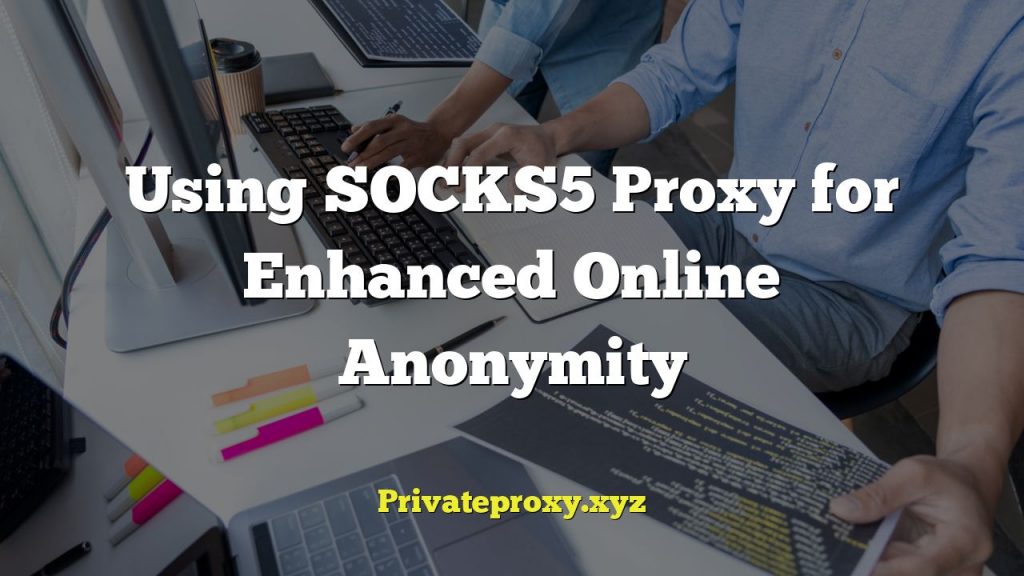
“`html
Understanding Proxies and Their Role in Account Management
A proxy server acts as an intermediary between your computer and the internet. Instead of connecting directly to a website, your request is routed through the proxy server. This provides several benefits, particularly when managing multiple accounts:
- IP Address Masking: The website sees the proxy server’s IP address instead of your actual IP address. This makes it appear as if multiple users are accessing the site from different locations.
- Geo-location Spoofing: Proxies allow you to choose a server in a specific geographic location, enabling you to access content or services that might be restricted in your region.
- Enhanced Security: Proxies can provide an additional layer of security by filtering malicious traffic and protecting your computer from direct attacks.
- Load Balancing: When managing multiple accounts, proxies can distribute your requests across different servers, preventing overload and ensuring smooth operation.
- Bypass Restrictions: Proxies can help bypass IP-based bans or restrictions imposed by websites, allowing you to continue accessing services even if your original IP address is blocked.
Types of Proxies: A Crucial Distinction
Choosing the right type of proxy is vital for safe and effective account management. Different proxies offer varying levels of anonymity, speed, and security.
- HTTP Proxies: These are the most common type of proxy, designed specifically for web traffic (HTTP and HTTPS). They are relatively easy to set up but often provide the lowest level of anonymity.
- SOCKS Proxies: SOCKS proxies are more versatile than HTTP proxies and can handle any type of traffic, including email, FTP, and torrents. They offer a higher level of anonymity as they don’t add HTTP headers that can reveal your identity. SOCKS5 is the latest and most secure version of the SOCKS protocol.
- Residential Proxies: These proxies use IP addresses assigned to real residential internet users. This makes them appear as genuine users, reducing the risk of detection by websites. Residential proxies are typically more expensive but offer superior anonymity and are less likely to be blocked.
- Datacenter Proxies: These proxies use IP addresses from data centers. They are generally faster and cheaper than residential proxies but are easier to detect as proxy servers. Websites are more likely to block datacenter IP addresses.
- Dedicated Proxies: A dedicated proxy is used exclusively by one user. This ensures consistent performance and avoids the risk of your IP address being flagged due to the actions of other users.
- Shared Proxies: A shared proxy is used by multiple users simultaneously. This is a more affordable option, but it can lead to slower speeds and a higher risk of being blocked.
- Rotating Proxies: These proxies automatically change the IP address after a certain period or a set number of requests. This further enhances anonymity and makes it more difficult for websites to track your activity.
Key Considerations for Selecting a Proxy Provider
Choosing a reputable proxy provider is essential for ensuring the safety and effectiveness of your account management strategy. Consider the following factors:
- Reliability and Uptime: Look for providers that guarantee high uptime and consistent performance. Downtime can disrupt your workflow and potentially lead to account suspension.
- Speed and Bandwidth: Choose a provider that offers fast speeds and sufficient bandwidth to handle your needs. Slow proxies can significantly impact your productivity.
- Security and Anonymity: Ensure that the provider uses strong encryption protocols and has a clear privacy policy that protects your data. Verify the type of proxy offered (e.g., SOCKS5 for enhanced security).
- Geographic Coverage: Select a provider that offers proxies in the locations you need to access specific content or services.
- Pricing: Compare pricing plans and choose one that fits your budget and usage requirements. Consider the cost per proxy, the amount of bandwidth included, and the availability of dedicated IPs.
- Customer Support: Choose a provider that offers responsive and helpful customer support. You may need assistance with setup, troubleshooting, or general inquiries.
- Authentication Methods: Providers commonly use either username/password or IP authentication. Consider which method is more convenient and secure for your needs.
- Proxy Pool Size: A larger proxy pool usually indicates more variety and less chance of overuse by other customers.
- Reviews and Reputation: Check online reviews and forums to get feedback from other users about the provider’s service quality and reliability.
Setting Up and Configuring Proxies
The process of setting up and configuring proxies varies depending on your operating system, browser, and the applications you’re using.
- Browser Configuration: Most browsers allow you to configure proxy settings directly. You’ll typically need to enter the proxy server’s IP address and port number in the browser’s settings menu.
- Operating System Configuration: You can also configure proxy settings at the operating system level, which will affect all applications that use the system’s internet connection.
- Proxy Management Software: Several proxy management software tools are available that simplify the process of setting up and managing proxies. These tools often provide features such as automatic proxy rotation, IP address checking, and performance monitoring.
- Application-Specific Configuration: Some applications, such as social media automation tools or web scraping software, have built-in proxy settings that allow you to configure proxies directly within the application.
- Testing Your Proxy: After setting up a proxy, it’s essential to test it to ensure that it’s working correctly. You can use online tools to check your IP address and verify that it matches the proxy server’s IP address.
Best Practices for Managing Multiple Accounts Safely
Using proxies is just one part of a comprehensive strategy for managing multiple accounts safely. Follow these best practices to minimize the risk of account suspension or ban:
- Use Unique Proxies for Each Account: Avoid using the same proxy for multiple accounts. This increases the risk of all accounts being flagged as belonging to the same user. Dedicated proxies are ideal for this purpose.
- Simulate Human Behavior: Avoid automating all your actions. Mimic human browsing patterns by varying your activity, spending time on different pages, and avoiding repetitive tasks.
- Use Different User Agents: User agents identify the browser and operating system you’re using. Use different user agents for each account to make it appear as if they are being accessed from different devices.
- Vary Your Connection Speed: Sudden changes in connection speed can raise suspicion. Use tools to simulate different connection speeds and avoid consistently using the fastest connection.
- Avoid Sharing Personal Information: Use different email addresses and usernames for each account. Avoid using the same password across multiple accounts.
- Follow the Website’s Terms of Service: Always adhere to the website’s terms of service and avoid engaging in activities that are prohibited or restricted.
- Warm Up New Accounts Gradually: Don’t immediately start engaging in high-volume activity on new accounts. Gradually increase your activity over time to build trust with the website.
- Monitor Your Accounts Regularly: Check your accounts regularly for any signs of suspicious activity, such as unexpected login attempts or unauthorized changes.
- Use Anti-Detect Browsers: Anti-detect browsers are specialized browsers designed to mask your digital fingerprint and make it more difficult for websites to track your activity. They offer advanced features such as user agent spoofing, canvas fingerprinting protection, and WebRTC leak prevention.
- Cookie Management: Properly manage cookies to prevent websites from tracking your activity across multiple accounts. Clear cookies regularly or use cookie management tools to isolate cookies for each account.
- Javascript Handling: Be aware that JavaScript can be used to gather information about your system. Consider disabling JavaScript or using a script blocker to limit the amount of information websites can collect.
Troubleshooting Common Proxy Issues
Even with careful planning, you may encounter issues when using proxies. Here are some common problems and how to troubleshoot them:
- Proxy Server Not Responding: This could indicate that the proxy server is down or that there is a network connectivity issue. Check your internet connection and try a different proxy server.
- Website Blocking the Proxy: Websites often block known proxy IP addresses. Try using a different proxy server or switching to a residential proxy.
- Slow Connection Speed: Slow connection speeds can be caused by overloaded proxy servers or network congestion. Try using a different proxy server or upgrading to a faster proxy plan.
- Authentication Errors: Double-check your username and password to ensure that you are entering them correctly. Contact your proxy provider if you continue to experience authentication errors.
- DNS Leaks: A DNS leak occurs when your DNS requests are not routed through the proxy server, revealing your actual IP address. Use a DNS leak test tool to check for DNS leaks and configure your system to use the proxy server’s DNS servers.
- WebRTC Leaks: WebRTC (Web Real-Time Communication) can reveal your actual IP address even when using a proxy. Disable WebRTC in your browser settings or use a browser extension to prevent WebRTC leaks.
- IP Address Blacklisting: If your proxy IP address has been blacklisted, you will be unable to access certain websites or services. Try using a different proxy server or contacting your proxy provider to request a new IP address.
- Incorrect Proxy Settings: Make sure the proxy settings are configured properly for each browser, application, or operating system. Double check the IP address, port number, and proxy type.
Legal and Ethical Considerations
While using proxies is generally legal, it’s important to be aware of the legal and ethical implications of your actions.
- Terms of Service: Always review and comply with the terms of service of the websites and services you are accessing. Some websites prohibit the use of proxies or multiple accounts.
- Copyright Infringement: Avoid using proxies to engage in copyright infringement or other illegal activities.
- Spamming and Fraud: Do not use proxies to send spam emails, commit fraud, or engage in any other unethical or illegal behavior.
- Data Privacy: Be mindful of data privacy and avoid collecting or sharing personal information without consent.
- Ethical Account Management: Use multiple accounts responsibly and ethically. Avoid using them to manipulate reviews, spread misinformation, or engage in other harmful activities.
- Jurisdictional Laws: Be aware of the laws and regulations in your jurisdiction regarding the use of proxies and online activities.
“`


